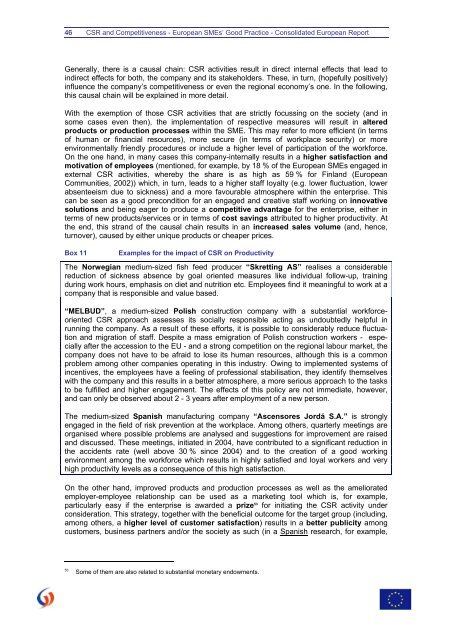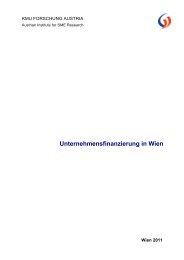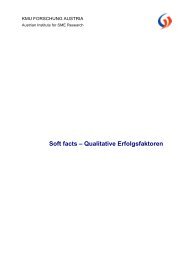CSR and Competitiveness European SMEs - KMU Forschung Austria
CSR and Competitiveness European SMEs - KMU Forschung Austria
CSR and Competitiveness European SMEs - KMU Forschung Austria
Create successful ePaper yourself
Turn your PDF publications into a flip-book with our unique Google optimized e-Paper software.
46 <strong>CSR</strong> <strong>and</strong> <strong>Competitiveness</strong> - <strong>European</strong> <strong>SMEs</strong>’ Good Practice - Consolidated <strong>European</strong> Report<br />
Generally, there is a causal chain: <strong>CSR</strong> activities result in direct internal effects that lead to<br />
indirect effects for both, the company <strong>and</strong> its stakeholders. These, in turn, (hopefully positively)<br />
influence the company’s competitiveness or even the regional economy’s one. In the following,<br />
this causal chain will be explained in more detail.<br />
With the exemption of those <strong>CSR</strong> activities that are strictly focussing on the society (<strong>and</strong> in<br />
some cases even then), the implementation of respective measures will result in altered<br />
products or production processes within the SME. This may refer to more efficient (in terms<br />
of human or financial resources), more secure (in terms of workplace security) or more<br />
environmentally friendly procedures or include a higher level of participation of the workforce.<br />
On the one h<strong>and</strong>, in many cases this company-internally results in a higher satisfaction <strong>and</strong><br />
motivation of employees (mentioned, for example, by 18 % of the <strong>European</strong> <strong>SMEs</strong> engaged in<br />
external <strong>CSR</strong> activities, whereby the share is as high as 59 % for Finl<strong>and</strong> (<strong>European</strong><br />
Communities, 2002)) which, in turn, leads to a higher staff loyalty (e.g. lower fluctuation, lower<br />
absenteeism due to sickness) <strong>and</strong> a more favourable atmosphere within the enterprise. This<br />
can be seen as a good precondition for an engaged <strong>and</strong> creative staff working on innovative<br />
solutions <strong>and</strong> being eager to produce a competitive advantage for the enterprise, either in<br />
terms of new products/services or in terms of cost savings attributed to higher productivity. At<br />
the end, this str<strong>and</strong> of the causal chain results in an increased sales volume (<strong>and</strong>, hence,<br />
turnover), caused by either unique products or cheaper prices.<br />
Box 11 Examples for the impact of <strong>CSR</strong> on Productivity<br />
The Norwegian medium-sized fish feed producer “Skretting AS” realises a considerable<br />
reduction of sickness absence by goal oriented measures like individual follow-up, training<br />
during work hours, emphasis on diet <strong>and</strong> nutrition etc. Employees find it meaningful to work at a<br />
company that is responsible <strong>and</strong> value based.<br />
“MELBUD”, a medium-sized Polish construction company with a substantial workforceoriented<br />
<strong>CSR</strong> approach assesses its socially responsible acting as undoubtedly helpful in<br />
running the company. As a result of these efforts, it is possible to considerably reduce fluctuation<br />
<strong>and</strong> migration of staff. Despite a mass emigration of Polish construction workers - especially<br />
after the accession to the EU - <strong>and</strong> a strong competition on the regional labour market, the<br />
company does not have to be afraid to lose its human resources, although this is a common<br />
problem among other companies operating in this industry. Owing to implemented systems of<br />
incentives, the employees have a feeling of professional stabilisation, they identify themselves<br />
with the company <strong>and</strong> this results in a better atmosphere, a more serious approach to the tasks<br />
to be fulfilled <strong>and</strong> higher engagement. The effects of this policy are not immediate, however,<br />
<strong>and</strong> can only be observed about 2 - 3 years after employment of a new person.<br />
The medium-sized Spanish manufacturing company “Ascensores Jordá S.A.” is strongly<br />
engaged in the field of risk prevention at the workplace. Among others, quarterly meetings are<br />
organised where possible problems are analysed <strong>and</strong> suggestions for improvement are raised<br />
<strong>and</strong> discussed. These meetings, initiated in 2004, have contributed to a significant reduction in<br />
the accidents rate (well above 30 % since 2004) <strong>and</strong> to the creation of a good working<br />
environment among the workforce which results in highly satisfied <strong>and</strong> loyal workers <strong>and</strong> very<br />
high productivity levels as a consequence of this high satisfaction.<br />
On the other h<strong>and</strong>, improved products <strong>and</strong> production processes as well as the ameliorated<br />
employer-employee relationship can be used as a marketing tool which is, for example,<br />
particularly easy if the enterprise is awarded a prize 53 for initiating the <strong>CSR</strong> activity under<br />
consideration. This strategy, together with the beneficial outcome for the target group (including,<br />
among others, a higher level of customer satisfaction) results in a better publicity among<br />
customers, business partners <strong>and</strong>/or the society as such (in a Spanish research, for example,<br />
53 Some of them are also related to substantial monetary endowments.




